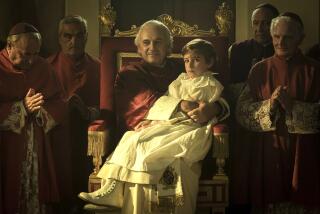MOVIE REVIEW : ‘RICCI’ EXPLORES THE HUMAN CONDITION
In his subtle and superb “The Death of Mario Ricci” (at the Fox International for one week, starting today), film maker Claude Goretta finds in a small Swiss village the universe in microcosm.
A distinguished TV journalist (Gian Maria Volonte) has gone there to interview a long-secluded authority (Heinz Bennent) on world hunger, arriving just as an Italian, a construction worker on a nearby tunnel, has been killed, apparently when his motorcycle collided with a car being test-driven by the town mechanic. These two entirely separate, seemingly mundane events nevertheless launch a film richly contemplative of the current state of the human condition.
Clearly a man given to thought, Volonte has ample opportunity for reflection because Bennent needs time to pull himself together for the interview. He has suffered a breakdown, in despair of ever solving the problem of famine--governments of many countries have consulted him but have rarely followed his advice. Meanwhile, Volonte, with his seasoned reporter’s innate nosiness, begins to take note of the impact of the death of the Italian upon the community.
What ensues is a consideration of human longing, frustration and selfishness, of our essential isolation from one another and our awareness of the transitory nature of relationships between people--in short, a consideration of life itself. On a less lofty level, the Italian’s death reveals an ugly xenophobia on the part of the Swiss; for that matter, Goretta, best known for his masterful “Lacemaker,” takes a rather dour view of small-town life with its undercurrent of nastiness and gossip. The film’s key moment, however, is a meeting Volonte has with Bennent in preparation for the interview. Living in a remote but elegant farmhouse, Bennent has turned to a study of the 17th-Century Dutch masters, seeking answers in art that he is no longer able to find in science.
The most dynamic of actors, Volonte reveals that he is no less effective in repose, holding our attention with a penetrating yet compassionate gaze that speaks volumes about the suffering and folly he has witnessed. Volonte, who took the best-actor prize at Cannes in 1983 for this performance, plays so well a character rarely seen on the screen, especially in American films: a truly adult male.
Although it may be said that Volonte carries the film, he gets lots of help, starting with Bennent’s tortured intellectual. And there’s lovely Magali Noel as a waitress at the local inn who responds warmly to Volonte; Mimsy Farmer as Bennent’s devoted, deeply concerned secretary, who attracts Volonte’s assistant (Jean-Michael Dupuis), and a young villager (Lucas Belvaux), more intelligent than his oafish pals, who seeks out Volonte, realizing who he is.
For all its philosophical tone, “The Death of Mario Ricci” (Times-rated: Mature for complex adult themes) is primarily a visual experience. Its theme is one of futility, but so beautifully expressed that it exemplifies the redeeming power of art that so concerns Goretta here. Technically, “The Death of Mario Ricci” becomes a mystery in regard to the fate of its title character, but Goretta plays against this to suggest that the real mystery is life itself.
‘THE DEATH OF MARIO RICCI’ A New Line Cinema release of a Franco-Swiss-German co-production: Pegase Films-Television Suisse Romande-Swanie Productions-F.R.3-Tele Munchen. Executive producer Daniel Messere. Writer-director Claude Goretta. Camera Hans Liechti. Music Arie Dzierlatka and Orchestre Osmose, plus selections from Vivaldi and Monteverdi. Additional music Christian Bonneau. Production designer Yanko Hodjis. Film editor Joele Van Effenterre. With Gian Maria Volonte, Magali Noel, Heinz Bennent, Mimsy Farmer, Jean-Michael Dupuis, Michel Robin, Lucas Belvaux, Claudio Caramaschi, Michel Hinz, Marblum Jequier, Sylvia Deruaz, Andre Schmidt. In French, with English subtitles.
Running time: 1 hour, 46 minutes.
Times-rated: Mature.
More to Read
Only good movies
Get the Indie Focus newsletter, Mark Olsen's weekly guide to the world of cinema.
You may occasionally receive promotional content from the Los Angeles Times.










